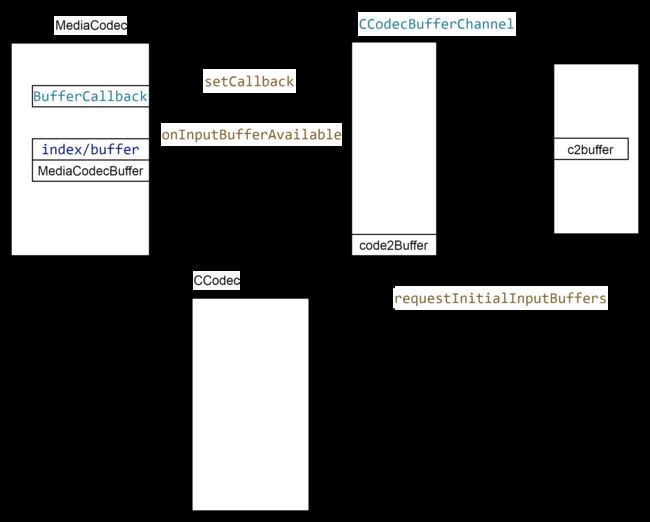Android codec2 视频框架 之输入buffer
文章目录
-
-
- 输入端的内存管理
- 输入数据包buffer结构体的转换
-

主要的流程如上, 申请内存在CCodecBufferChannel,申请之后回调到MediaCodec。然后应用从MediaCodec获取 将解码数据放到buffer中,CCodecBufferChannel在将这块buffer 送到componet模块。
输入端的内存管理
- 内部解码输入buffer的申请个数以及获取方式
mediacodec 中会申请一部分(默认情况下是4个)待解码的buffer。
status_t CCodecBufferChannel::requestInitialInputBuffers() {
if (mInputSurface) {
return OK;
}
size_t numInputSlots = mInput.lock()->numSlots;
struct ClientInputBuffer {
size_t index;
sp buffer;
size_t capacity;
};
std::list clientInputBuffers;
{
Mutexed::Locked input(mInput);
while (clientInputBuffers.size() < numInputSlots) {
ClientInputBuffer clientInputBuffer;
if (!input->buffers->requestNewBuffer(&clientInputBuffer.index,
&clientInputBuffer.buffer)) {
break;
}
}
}
其中在构造函数中定义了
constexpr size_t kSmoothnessFactor = 4;
input->numSlots = kSmoothnessFactor;
这个buffer 外部有两种方式可以获取到。
- 直接调用dequeueInputBuffer。
- 设置回调到Mediacodec,有buffer 可用的时候 回调到callback中。
输入输出都可以这样做, 在NuPlayer 中是设置回调到mediacodec,然后mediacodec回调回来。nuplayer中是在MediaCodec 有bufer 可用的时候 handleAnInputBuffer 从source读取数据,这个是一个新的 ABuffer buffer,读到数据后将会有拷贝的动作 将ABuffer拷贝到MediaCodecBuffer中。
sp reply = new AMessage(kWhatCodecNotify, this);
mCodec->setCallback(reply);
- 输入buffer的申请、存储
在CCodecBufferChannel中 requestInitialInputBuffers 将调用input->buffers->requestNewBuffer申请到index和buffer。这些buffer也同时存储到input->buffers中。然后通过回调 回调到Mediacodec的kWhatFillThisBuffer,FillThisBuffer的 updateBuffers 存储buffer到mPortBuffers,存储index 到mAvailPortBuffers。 如果有设置callback的话,会把index 返回给注册callback的地方。如果是getInputBuffer 那么获取的是CCodecBufferChannel的input->buffers.
上述的回调有两个地方会调用
- InitialInputBuffers的时候。
- 是feedInputBufferIfAvailable的时候。而feedInputBufferIfAvailable 在onWorkDone, discardBuffer、renderOutputBuffe、onInputBufferDone等都可会调用。
MediaCodec.cpp
status_t MediaCodec::init(const AString &name) {
mBufferChannel->setCallback(
std::unique_ptr(
new BufferCallback(new AMessage(kWhatCodecNotify, this))));
}
ccodec.cpp
void CCodec::start() {
(void)mChannel->requestInitialInputBuffers();
}
MediaCodec.cpp
void BufferCallback::onInputBufferAvailable(
size_t index, const sp &buffer) {
sp notify(mNotify->dup());
notify->setInt32("what", kWhatFillThisBuffer);
notify->setSize("index", index);
notify->setObject("buffer", buffer);
notify->post();
}
- 申请的内存不够的情况会怎么处理?
在nuplayer中拷贝解码数据到mediacodec的时候 会判断从codec取出来的buffer 够不够 不够的话会报错。而这个buffer 大小的申请也是外部设置的,一般是在解析的时候能够知道 最大是多少。比如下面的MP4解析的代码中会获取box 中sample的最大值,然后依据这个值设定输入的buffer的最大值。
bool NuPlayer::Decoder::onInputBufferFetched(const sp &msg) {
CHECK(msg->findSize("buffer-ix", &bufferIx));
CHECK_LT(bufferIx, mInputBuffers.size());
sp codecBuffer = mInputBuffers[bufferIx];
sp buffer;
bool hasBuffer = msg->findBuffer("buffer", &buffer);
if (needsCopy) {
if (buffer->size() > codecBuffer->capacity()) {
handleError(ERROR_BUFFER_TOO_SMALL);
mDequeuedInputBuffers.push_back(bufferIx);
return false;
}
}
status_t NuPlayer::Decoder::fetchInputData(sp &reply) {
status_t err = mSource->dequeueAccessUnit(mIsAudio, &accessUnit);
reply->setBuffer("buffer", accessUnit);
}
sp LinearInputBuffers::Alloc(
const std::shared_ptr &pool, const sp &format) {
int32_t capacity = kLinearBufferSize;
(void)format->findInt32(KEY_MAX_INPUT_SIZE, &capacity);
}
size_t max_size;
err = mLastTrack->sampleTable->getMaxSampleSize(&max_size);
if (max_size != 0) {
if (max_size > SIZE_MAX - 10 * 2) {
ALOGE("max sample size too big: %zu", max_size);
return ERROR_MALFORMED;
}
AMediaFormat_setInt32(mLastTrack->meta,
AMEDIAFORMAT_KEY_MAX_INPUT_SIZE, max_size + 10 * 2);
}
- PipelineWatcher控制外部输入buffer的速度
监控输入buffer的情况,有buffer送入解码器的时候 mFramesInPipeline 存储buffer、index 和时间。送入componet 处理完成之后调用onWorkDone从队列中删除。而这个mFramesInPipeline队列的大小不能超过mInputDelay + mPipelineDelay + mOutputDelay + mSmoothnessFactor.默认是4,就是输入最多存储4块了,超过4块,就不会回调到外部,让外部送数据进来了。
if (!items.empty()) {
{
Mutexed::Locked watcher(mPipelineWatcher);
PipelineWatcher::Clock::time_point now = PipelineWatcher::Clock::now();
for (const std::unique_ptr &work : items) {
watcher->onWorkQueued(
work->input.ordinal.frameIndex.peeku(),
std::vector(work->input.buffers),
now);
}
}
err = mComponent->queue(&items);
}
while (!mPipelineWatcher.lock()->pipelineFull()) {
sp inBuffer;
size_t index;
{
Mutexed::Locked input(mInput);
numActiveSlots = input->buffers->numActiveSlots();
ALOGD("active:%d, numslot:%d", (int)numActiveSlots, (int)input->numSlots);
if (numActiveSlots >= input->numSlots) {
break;
}
if (!input->buffers->requestNewBuffer(&index, &inBuffer)) {
ALOGE("[%s] no new buffer available", mName);
break;
}
}
ALOGE("[%s] new input index = %zu [%p]", mName, index, inBuffer.get());
mCallback->onInputBufferAvailable(index, inBuffer);
}
输入数据包buffer结构体的转换
- MediaCodec 层
ABuffer(Nuplayer)------>MediaCodecBuffer ----->C2Buffer
- Nuplayer: 拷贝解码数据到前面requestInitialInputBuffers申请的Codec2buffer(基类是MediaCodecBuffer)
- MediaCodec: Nuplayer中拷贝好的buffer queueInputBuffer到MediaCodec 中,MediaCodec要把这块buffer 传递到
底下具体的componet需要要转换为一个c2buffer。这个c2buffer封装在c2work中 queue 到componet中。
- componet层:
是调用到simplec2componet 中,调用的是queue_nb。 在simpleC2的实现中是发送一个process的消息到looper
执行processQueue,processQueue在调用到具体的解码componet的proces进行处理。
std::unique_ptr work(new C2Work);
work->input.ordinal.timestamp = timeUs;
work->input.ordinal.frameIndex = mFrameIndex++;
// WORKAROUND: until codecs support handling work after EOS and max output sizing, use timestamp
// manipulation to achieve image encoding via video codec, and to constrain encoded output.
// Keep client timestamp in customOrdinal
work->input.ordinal.customOrdinal = timeUs;
work->input.buffers.clear();
sp copy;
bool usesFrameReassembler = false;
if (buffer->size() > 0u) {
Mutexed::Locked input(mInput);
std::shared_ptr c2buffer;
if (!input->buffers->releaseBuffer(buffer, &c2buffer, false)) {
return -ENOENT;
}
}
err = mComponent->queue(&items);